Clifford Garstang's Blog, page 9
November 28, 2023
Happy Birthday to Me!
 Happy Birthday to Me!
Happy Birthday to Me!Seventy years ago, my mother gave birth to me in Ft. Wayne, Indiana. At least that’s what my birth certificate says. I don’t remember Ft. Wayne because we left there when I was one.
Sixty years ago, I was in the 5th Grade in Indianapolis at School #84. I don’t have much memory of that school, although not long ago I reconnected with some of my classmates. Unlike my previous school in Indianapolis, to which I could walk, I rode a city bus, which must have been wild. Shortly before I turned eleven, in 6th grade, we moved to Peoria, Illinois.
Fifty years ago, early in my third year at Northwestern University, I struggled with classes. I was having fun (perhaps a little too much) but lacked motivation. I didn’t know what I wanted to do with my life. I had started college thinking I wanted to be a writer, but I had no idea of how to make that happen, and my philosophy major sometimes made my head spin. Although I wasn’t getting into trouble, my father was frustrated with me because he knew I had the potential to do so much better.
Forty years ago, I was preparing to embark on an amazing adventure/opportunity. The decade of my 20s was packed with accomplishments: I managed to graduate from Northwestern; I served two years in the Peace Corps in South Korea and traveled through Southeast Asia on a shoestring for several months; I earned an MA in English and a law degree, finishing both with honors; and I moved to Chicago to join one of the biggest/best law firms in the country. And now I was about to move to Singapore to work in that law firm’s office there. What a difference a decade makes!
Thirty years ago, I was back in school, having resigned my partnership in my law firm (although technically they kept me on as “of counsel” for another year so I could do a little work for one of my clients and stay on the firm’s health insurance). At Harvard’s Kennedy School of Government, I was retooling for a new career in International Development, my goal being to work for the World Bank in Washington or possibly the Asian Development Bank in Manila. The decade of my 30s had also been full: moving to Singapore twice (with a stint in Los Angeles in between those moves during which I was promoted to partnership in the firm); and developing a law practice unlike any of my peers back in Chicago.
Twenty years ago, I was embarking on yet another new career, as a writer. I had succeeded in my 40s in landing a position in the legal department of the World Bank and in that job traveled frequently to East Asia. It was work I enjoyed and believed in, but in the new millennium, after 20 years of practicing law, I felt the pull of my old ambition to write. So, I left the World Bank (although for several years I continued to work for them part-time as a consultant) and enrolled in an MFA program in creative writing in order to find my way as an artist and develop a community of writers. I graduated from that program in 2003 and was just beginning to place short stories in literary magazines.
Ten years ago, I achieved some success as a writer. In the fall of that year, my second published book, What the Zhang Boys Know, a novel in stories, won the Library of Virginia Literary Award for Fiction, a recognition that was enormously gratifying. (My first book, In an Uncharted Country, had come out three years earlier.) I was no longer doing any legal work. I was writing full-time and occasionally teaching creative writing. And while I wasn’t making much money as a writer, I was doing what I wanted to do, what I had wanted to do since I was a kid, and not many people can say that.

Now, my sixth book, my third novel, is coming out in just three months: The Last Bird of Paradise. This one took several years to write, but I’m very pleased with the result. The other books published in the last decade also please me (The Shaman of Turtle Valley, House of the Ancients and Other Stories, and Oliver’s Travels, which is now available as an audiobook), but the COVID-19 pandemic limited their reach, I’m sad to say. Still, they’re out there, in print, and people are still reading them. I’m not done yet, and I’m working on a new project in its early stages, very different from anything I’ve done to date.
That’s a long-winded way of saying Happy Birthday to Me! To help me celebrate, consider checking out one or more of the books linked above. The publisher of the new book, The Last Bird of Paradise, which comes out on February 22, 2024, is offering a 15% discount for pre-orders. Use code PREORDER2023.
Thank you!
November 15, 2023
Atmospheric Research: Beginning a new project
I recently had the pleasure of spending a few weeks in Berlin, Germany. The purpose of the trip was two-fold: I’ve heard wonderful things about Berlin and simply wanted to visit and explore, but also, I’m in the very early stages of a new book that I thought would benefit from what I’ve been calling “atmospheric research.”
The term, which I made up, requires definition, but before I attempt to do that, I should back up. The new project arose out of a trip I made last year to Vienna. I visited wonderful museums there, listened to great classical music, and generally soaked up all that Vienna had to offer. Even though I’m not planning to set the new book in Austria or Germany, Germanic culture (art, music, language) is in my mind as I shape and write this new work, so I felt that another dose of it, in a different city, was in order.
I wasn’t scouting locations for scenes in the book, or identifying particular buildings or specific menus, but I was immersing myself in the atmosphere—history, attitudes, sounds, people, etc. Hence, “atmospheric research.”
Berlin is a fascinating city, with many more museums and historic sites than I could get to, despite all the walking I did and all the forms of public transportation I used (subways, trams, light rail, buses, regional trains, and even the airport express train). I visited a number of cold-war sites, Berlin wall remnants, and Holocaust memorials. I ate wonderful German food (some of which, like American food, isn’t really native but is borrowed from other cuisines), drank German wine, and sampled German craft beer.





 Scenes from Berlin
Scenes from BerlinImportantly, I also did a fair amount of reading before, during, and after the trip. I had asked on social media for recommendations of fiction set in Berlin, especially after the reunification of East and West Germany, and got some great ones. First up was Go, Went, Gone by the German writer Jenny Erpenbeck. I became an instant fan and also read her short novel Visitation while I was there. (I still have her memoir and most recent novel waiting to be read.) Then I read Lessons by Ian McEwan, which is a sprawling book about some very challenging topics, but one of its subjects is the oppression in East Germany before the collapse of the regime there. I also read Deborah Levy’s The Man Who Saw Everything, a truly compelling story that bends time and memory in a way that I liked very much. I believe I learned a lot about Germany from reading these books, even though they are novels and not history books. More atmosphere for me to absorb.
So, what’s the new project about? Sorry, it’s too early to say. I know from experience that the final product could be very different from what I envision at this stage. Stay tuned.
The Shenandoah Valley today is a hazy mess, with smoke from mountain wildfires making the air dangerous and unpleasantly pungent. I hope wherever you are you are keeping safe and healthy.
p.s. Yesterday, November 14, was the release date for the audiobook version of my novel Oliver’s Travels. The book is narrated by a fine voice actor named Rex Anderson and I’ve enjoyed listening to parts of the book. What a new experience it is for me to listen to someone else reading my words! If you are a “reader” of audiobooks, Oliver’s Travels is available from Audible. And if you prefer physical books, those can be purchased from online retailers or ordered from your local independent bookstore.
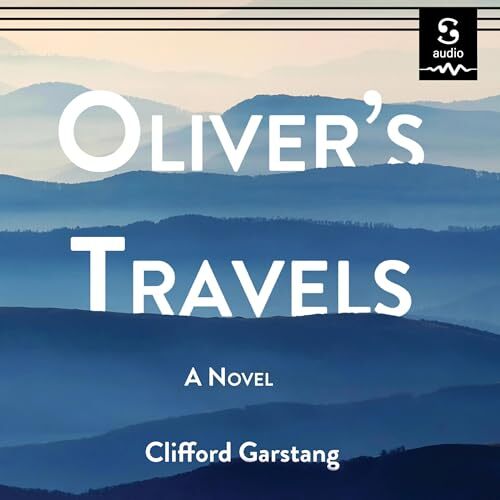
November 1, 2023
The Next Book–Part 6: Cover Reveal and Pre-Order Discount!
[Previous installments in this series included a discussion of the inspiration for my new book, the challenges I faced in deciding at what point in the story to start the book, doing research for the historical elements of the novel, actually writing the book, including settling on a structure, and finding a publisher.]
Now, finally, it is time to tell you what the next book, The Last Bird of Paradise, is all about and give you the opportunity to pre-order the book from the publisher at a pre-release discount. (Scroll down for the pre-order discount code.)
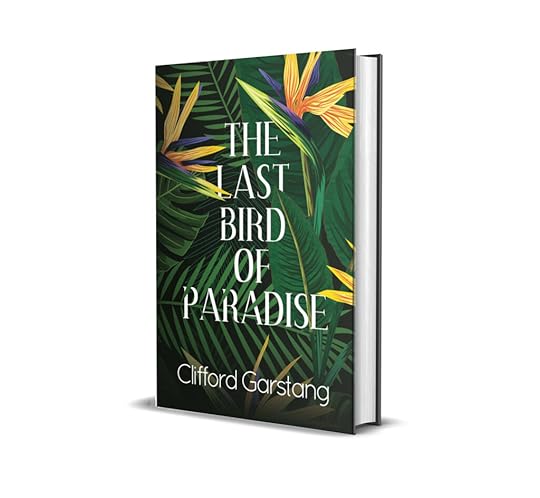
Two women, nearly a century apart, seek to rebuild their lives when they reluctantly leave their homelands. Arriving in Singapore, they find romance in a tropical paradise, but also find they haven’t left behind the dangers that caused them to flee.
In the aftermath of 9/11 and haunted by the specter of terrorism, Aislinn Givens leaves her New York law practice and joins her husband in Southeast Asia when he takes a job there. Seeking to establish herself in a local law firm, Aislinn begins to understand the historic resentment of foreigners who have exploited the region for centuries. Learning about the turmoil of Singapore’s colonial period, she acquires several paintings done by an English artist during World War I that she believes are a warning to her. The artist, Elizabeth Pennington, tells her own tumultuous story through diary entries that come to an end when the war reaches the colony with catastrophic results. In the present, Aislinn and her husband learn tragically that terrorism takes many shapes when they are ensnared by local political upheaval and corruption.
In a lyrical blend of historical and contemporary drama, The Last Bird of Paradise explores the consequences of power imbalances—both domestic and geopolitical—against a lush, tropical backdrop. Clifford Garstang, author of the award-winning novel Oliver’s Travels, once again draws on his decades of experience in Asia to tell an unforgettable story of romantic intrigue.
Here’s what a few wonderful writers have to say about it:
I really enjoyed this fascinating novel by Clifford Garstang, who brings his experience as an attorney in Singapore to enrich a story of two women, a century apart, living parallel lives, linked by artwork that appears to come alive. Part history, part romance, part corporate intrigue, The Last Bird of Paradise is well written and propulsive—I didn’t want to put it down!
~Daphne Kalotay, author of The Archivists
In evocative and authoritative prose, The Last Bird of Paradise, tells a compelling story of two women who travel to Singapore not of their own volition and a century apart. Garstang’s sympathetic imagination transports us in the manner of my favorite kind of fiction – that which convinces the reader of setting and character not because of the author’s resemblance to the protagonist but because the author is a virtuoso shapeshifter and spell weaver.
~Robin Hemley, author of Oblivion: An After Autobiography and Borderline Citizen: Dispatches from the Outskirts of Nationhood
Aislinn Givens leaves a settled life in Manhattan for an unsettled life in Singapore. But that’s only part of a story that tracks back and forth over the span of a century and keeps returning to a vibrant painting. That painting radiates mystery and longing. So does Clifford Garstang’s vivid and simmering novel, The Last Bird of Paradise.
~John Dalton, author of Heaven Lake and The Inverted Forest
The book will be published on February 22, 2024, by Black Rose Writing and pre-orders now will receive a 15% discount by using the promo code PREORDER2023.
October 31, 2023
2023 Reading–October
 Go, Went, Gone by Jenny Erpenbeck
Go, Went, Gone by Jenny ErpenbeckGo, Went, Gone by Jenny Erpenbeck was recommended to me in preparation for my upcoming trip to Berlin. The novel, translated from German by Susan Bernofsky, is about Richard, a recently retired professor who is coping with many changes in his life. He has just retired, his wife died recently, he’s still not completely used to German reunification, and he’s just become aware of the presence of African refugees in Berlin. Many of these refugees have fled violence in Libya, although they are from various other African countries. After surviving dangerous voyages across the Mediterranean, they arrived in Italy, only to find no opportunities there. So they’ve come to Germany to face a Catch-22—even if Germany wanted them, under a European treaty, they have to be dealt with by their first country of entry. Richard is nearly as perplexed as the refugees are, but he tries to help them. It’s a dense novel that addresses important issues in Germany and across Europe.
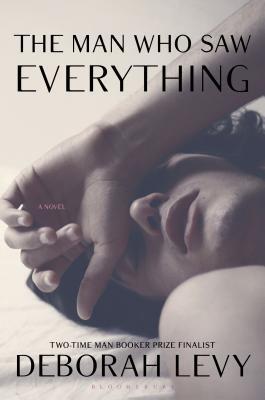 The Man Who Saw Everything by Deborah Levy
The Man Who Saw Everything by Deborah LevyThe Man Who Saw Everything by Deborah Levy was also recommended to me to help me understand Berlin’s environment, but I didn’t read it until the flight home from Germany. Because I’d spent three weeks in the city at that point, the territory and the history of what Saul, the main character in the novel, faces were familiar to me. Still, much of it surprises–from the warped sense of time and memory, the similarly warped sense of beauty and love, to the erratic thought process of Saul. I don’t think the book is perfect and I don’t think Levy gets the character of Saul quite right. Nonetheless, it provided excellent distraction on a long flight.
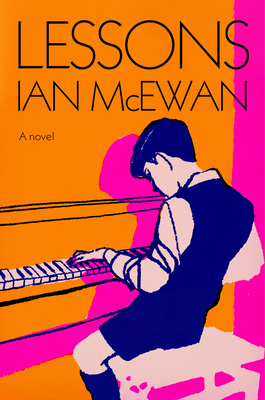 Lessons by Ian McEwan
Lessons by Ian McEwanLessons by Ian McEwan is another novel set partly in Berlin, but it’s about so much more than that. The main character is the son of a British military man and his wife who are posted in North Africa. The son is sent back to England to school where he studies piano and falls under the influence of his pretty piano teacher. At the age of fourteen, he begins an intense sexual relationship with her that truly warps him for life. Later he has a series of relationships, eventually marrying a woman who was briefly his German teacher. When she leaves him and their infant son, he embarks on a quest to understand her and at the same time tries to understand what happened to him as a child. His ex-wife becomes a very successful novelist in Germany, and some of what she writes about deals with the anti-Nazi movement, while the protagonist himself is trying to understand first the divide of Berlin and then the changes wrought by the wall’s collapse.
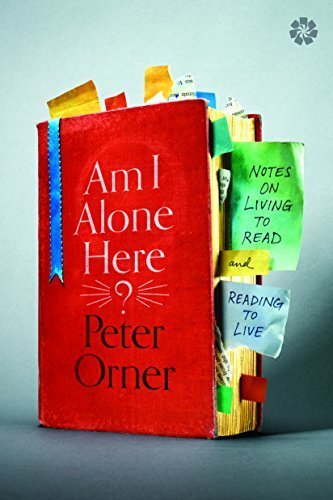 Am I Alone Here? by Peter Orner
Am I Alone Here? by Peter OrnerAm I Alone Here? Notes on Living to Read and Reading to Live by Peter Orner is a collection of personal essays, most of which connect the author’s observations on reading with his own life experiences. It’s quite an enjoyable read because of that. In the process of his astute interpretation of many works—some well-known, some a bit more obscure—he also reveals things about his relationships with his father, his ex-wife, his daughter, his mentor, and others. Perhaps because I met the author when he was a fellow years ago at the Bread Loaf Writers’ Conference (I was a mere participant), I found the book charming and enlightening.
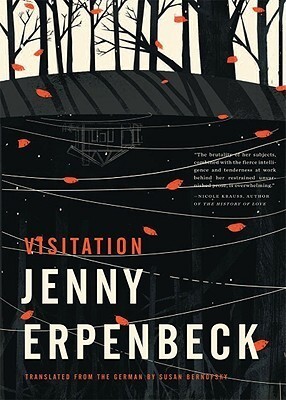 Visitation by Jenny Erpenbeck
Visitation by Jenny ErpenbeckVisitation by Jenny Erpenbeck is yet another novel by this German writer, again translated by Susan Bernofsky. This one is quite challenging, but it tells the story over time of a house on a lake near Berlin that witnesses the devastating course of the many horrors of the 20th Century in Germany: the murder of the Jews, the arrival of Russian soldiers in the Battle of Berlin, the restrictive nature of the East German government. It’s a bit like a time-lapse photograph in which the house and garden undergo constant changes. Trees grow and are cut down, crops are planted and then devastated by bugs, people are born, grow old, die. It’s a short, dark book.
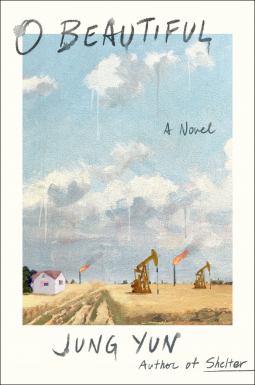 O Beautiful by Jung Yun
O Beautiful by Jung YunO Beautiful by Jung Yun has some strong points, but I had a very hard time caring about the protagonist, who seemed determined to be difficult to deal with. Understandably, perhaps—she had a background that maybe created that attitude, having faced both racial and gender discrimination—but for a journalist who needs other people to provide information and help, she was needlessly antagonistic. The story is about a woman who visits North Dakota to write a story about the oil boom there and the impact on a particular town of the arrival of outsiders. Her interest shifts to the impact on women, both local and newly arrived. But the book ends abruptly without any clear resolution. Does she finish her article? Does she find her mother (who walked out the family when her daughters were quite young)? Do any of the other loose ends get tied up?
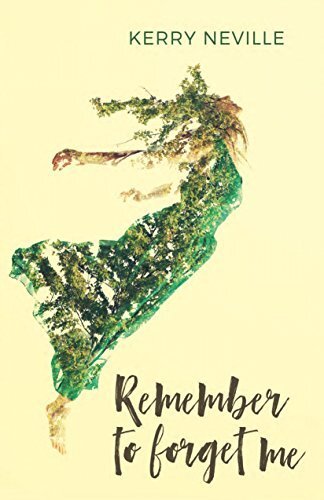 Remember to Forget Me by Kerry Neville
Remember to Forget Me by Kerry NevilleRemember to Forget Me by Kerry Neville is a collection of fine short stories published by Braddock Avenue Books (which published my novel The Shaman of Turtle Valley). Many of the stories are about relationships between men and women, even when those relationships are not at the center of the story. Often, when the relationships are central, there’s something decayed, a kind of rot that indicates the coming end. The settings are neatly varied—New York, rural America, Greece, Romania, etc.—which adds a nice rhythm to the overall collection.
October 30, 2023
The Next Book–Part 5: Finding a Publisher

[Previous installments in this series included a discussion of the inspiration for my new book, the challenges I faced in deciding at what point in the story to start the book, doing research for the historical elements of the novel, and actually writing the book, including settling on a structure.]
By late summer of 2022, I had finished the novel. I had come to the end before, several times, but when I say I finished it, I mean that I had revised it substantially, filled in all the holes I could find, and considered it ready for the next step.
And what would that next step be? I know many writers who self-publish their books. That’s fine for them, but it’s still not for me. Very few self-published books attract much attention from readers or reviewers. Traditional publishing—meaning turning the process over to a publisher who is responsible for editing, design, printing, and distribution—is still the best way to reach a wider audience.
The trick is to find a publisher who is willing to invest in the book. One method of finding a publisher is to first find an agent who, for a cut of eventual royalties, will do the work of finding a publisher for you, often making editorial suggestions for further revision. I’ve had agents for previous books, but in each case ended up selling the rights to the books to a small press after the agent had decided they wouldn’t be able to place the book with a larger press. The result of following that path was a delay in publication while the agents made their pitches to bigger publishers. This time, I resolved to skip the agent search and submit directly to small presses from the outset.
I mentioned this intention to a mentor who urged me to try the agent route first and suggested the names of a few agents to query. He even helped me hone my query letter (the letter one sends to agents that summarizes both the project and the writer’s background). So I queried. It’s been several years since my last round of agent queries, and it seems to me that the industry has changed in that time. Some agents have software that generates an automatic acknowledgment of a query, but some don’t. That acknowledgment may be the last you ever hear from them. And many never respond at all. I gave it a couple of months (not enough time if one is really committed to finding an agent and a larger press) and then concluded I was unlikely to connect with an agent this time around.
I then began to approach small presses, several of which expressed an interest in publishing my novel. (It didn’t happen overnight, despite how I’ve made it sound.) Ultimately, I accepted an offer from one of them, a press I had not worked with before. That began a year-long process that is now nearing completion. The first step was for me to do another round of self-editing to make sure the manuscript was in the best shape it could be. At that stage, I asked a friend to read the book and took some of her comments into account. The next step was editing by the publisher, after which I had an opportunity to accept or reject those edits. They then gave me one more chance to read through the book in its “uncorrected proof” form to find any errors. In the meantime, the designer sent me a cover for approval. I loved the design and immediately approved it.
We’re now in the last phase before the book goes into production, including gathering blurbs (endorsements) from some fine writers I respect. With the help of a publicist, I’m also setting up events, interviews, and reviews to help spread the word about the book. With just over four months before the publication date, we’re almost done!
Next: Cover Reveal and Pre-Orders.
Oliver’s Travels is now an audiobook
 Oliver’s Travels by Clifford Garstang
Oliver’s Travels by Clifford GarstangI’m excited to reveal that my novel, Oliver’s Travels, will be released on audio on November 14. You can pre-order (with a nice discount) from Audible. It will also be available on the Scribd audiobook subscription service. Physical copies of the novel, which was published in 2021 by Regal House Publishing, can be ordered from the publisher, online booksellers, and most independent bookstores. It is also available as an eBook.
Oliver’s Travels tells the story of Ollie Tucker, a recent college graduate who is obsessed with the nature of knowledge and truth. He is also haunted by a childhood memory of trauma that he can’t bring fully into focus. When Ollie discovers that his uncle, whom he had thought to be dead, is still alive somewhere in the world, he resolves to find him and finally confront the specter of abuse he believes he has suffered. It’s part philosophy, part psychological mystery, and part travel story.
October 2, 2023
I’ve Got Questions for Virginia Pye
Editor’s Note: This exchange is part of a series of brief interviews with emerging writers of recent or forthcoming books. If you enjoyed it, please visit other interviews in the I’ve Got Questions feature.
 The Literary Undoing of Victoria Swann by Virginia PyeWhat’s the title of your book? Fiction? Nonfiction? Poetry? Who is the publisher and what’s the publication date?
The Literary Undoing of Victoria Swann by Virginia PyeWhat’s the title of your book? Fiction? Nonfiction? Poetry? Who is the publisher and what’s the publication date?The Literary Undoing of Victoria Swann, pub date: October 3, 2023, Regal House Publishing
In a couple of sentences, what’s the book about?Victoria Swann is a successful author of romance and adventure novels who becomes a champion of women’s rights as she takes on the literary establishment and finds her true voice, both on and off the page. Everything changes for Victoria when she goes against her publisher’s demands and abandons her frivolous style to tell her own story. Her new, young, Harvard-bred editor becomes her unexpected ally as she fights for the women who have been her faithful readers. Set in Gilded Age Boston, The Literary Undoing of Victoria Swann shows writing and reading as acts of defiance and revision in life and revision on the page as intimately entwined.
What’s the book’s genre (for fiction and nonfiction) or primary style (for poetry)?Fiction; historical fiction
What’s the nicest thing anyone has said about the book so far?It’s a toss-up between:
“The Literary Undoing of Victoria Swann is a captivating and delicious novel.” – Margot Livesey, author of The Boy in the Field
Or:
“Virginia Pye has written a novel as full of vital ideas about truth, progress and how to live with intention as it is with wild romps and charming encounters. The Literary Undoing of Victoria Swann may be set in Gilded Age Boston, but it’s a celebration of readers, writers and bookstores everywhere.” – Elizabeth Graver, author of Kantika
What book or books is yours comparable to or a cross between? [Is your book like Moby Dick or maybe it’s more like Frankenstein meets Peter Pan?]I’m never good at coming up with comps, but I’d say it’s like The Paris Bookseller, by Kerri Maher or The Gilded Age, by Claire McMillan.
Why this book? Why now?The Literary Undoing of Victoria is about a woman finding her voice both on and off the page. It shows the joy of creating—in this case, writing. It’s a book lover’s story and a feminist story. And although it is set in the Gilded Age, it explores issues vital to us today, including abortion and immigrant rights, freedom to love whomever we choose, and addiction.
Other than writing this book, what’s the best job you’ve ever had?I loved teaching writing, especially to adults. My students at NYU School of Continuing Education had stories to tell and I loved encouraging them to do so.
What do you want readers to take away from the book?I want them to be entertained while reading and to later mull over how the past informs our moment today and how we can be guided by that into a better future. But first, I want them to fall in love with my characters and enjoy the story.
What food and/or music do you associate with the book?Hmmm…sherry? It seems appropriately Victorian. But also, how about Chinese food and Irish soda bread, because Chinese- and Irish- American characters have a lot to say in this story, too.
What book(s) are you reading currently?I just finished Bill Roorbach’s Lucky Turtle, which I loved and I’m now reading another book I can already tell I love and admire: This is Happiness by Naill Williams. Both novels are about human connection and warmth, with some conflict, too, but mostly big-heartedness. That’s what my novel aims for, too.
 Virginia Pye
Virginia PyeLearn more about Virginia on her website.
Follow her on Instagram, Facebook, Twitter, and Threads.
Buy the book from the publisher (Regal House Publishing) or Bookshop.org.
October 1, 2023
2023 Reading–September
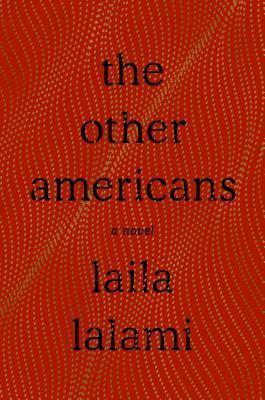 The Other Americans by Laila Lalami
The Other Americans by Laila LalamiThe Other Americans by Laila Lalami is a novel (and finalist for the 2019 National Book Award) about Nora, the daughter of Moroccan immigrants. Her father, who fled Morocco because of political repression there and now runs a diner in Southern California, is killed in a hit-and-run incident. She’s distraught, which causes tension with her mother and sister, and she pushes the detective investigating the incident to find the killer even though there are apparently no witnesses. Meanwhile, she reconnects with Jeremy, a former high school friend who became a Marine serving in Iraq and is now a policeman. He’s different from the other men she’s been involved with. She’s also at odds with her mother and sister and can’t seem to let go of anything. All of these characters have interesting backstories that make them believable and mostly sympathetic. In college, Nora switched from medicine to music studies, over her mother’s objections. The mother hadn’t wanted to emigrate, but did so when her husband insisted, and still is resentful. Jeremy had a tough relationship with his own father, an alcoholic, and joined the Marines, then served in Iraq before becoming a cop. All of which makes for an engaging story that is more than just a mystery. While the book is engaging in most regards, there are a couple of loose ends that are left unresolved, and that bugged me a little because it seems to me they could have been. Still, I enjoyed the read.
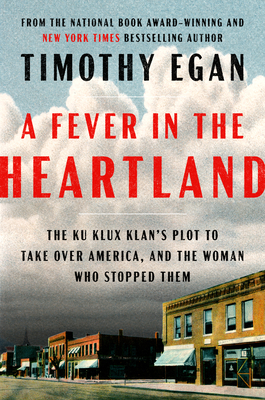 A Fever in the Heartland by Timothy Egan
A Fever in the Heartland by Timothy EganA Fever in the Heartland: The Ku Klux Klan’s Plot to Take Over America, and the Woman Who Stopped Them by Timothy Egan is a frightening book on a couple of levels. First, although we all know about the KKK, I wasn’t aware of how powerful they were in the 1920s. Second, the parallels between the KKK’s agenda of hate and the agenda of the Trump/MAGA crowd are just too clear; it’s as if they are a repackaged version of the Klan. For me, the book was especially interesting because its primary focus is on a scumbag named D.C. Stephenson who rose to power in the Indiana branch of the Klan and ruled his empire from Indianapolis (where I lived as a kid). The size of the membership of the KKK in Indiana and several neighboring states that Stephenson also controlled is staggering, and the fact that so many politicians, judges, and law enforcement officials were members is truly disturbing. However, the woman mentioned in the subtitle didn’t knowingly stop the Klan. It might have made a nice story if she had, but what Stephenson did to her was used by others to stop them after she died. Plus, the book seems to conclude that the Klan was killed by the events described in the book, and that simply isn’t the case, not even in Indiana. I remember being warned in the 1970s that Martinsville, a small city between Indianapolis, where my parents lived, and Bloomington, where I was in graduate school, was a hotbed of Klan activity. The KKK has not gone away.
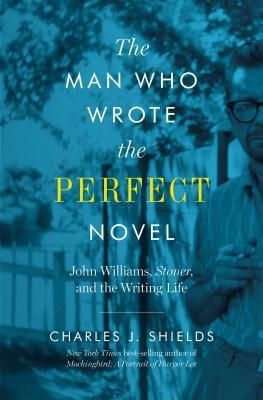 The Man Who Wrote the Perfect Novel by Charles J. Shields
The Man Who Wrote the Perfect Novel by Charles J. ShieldsThe Man Who Wrote the Perfect Novel: John Williams, Stoner, and the Writing Life by Charles J. Shields is a fascinating biography about a writer who I thought had receded in importance. Few non-academics or non-writers seem to recognize his name these days, because his most important work, Stoner, is set in academia and was published so long ago. And while it’s a wonderful novel, it seems quite dated, no matter how highly regarded it once was. As this book notes, though in the past decade, there has been more interest in the novel (and by extension in Williams’s other novels) because of growing readership in Europe driven by effective marketing. In any event, the biography is very readable (in spite of a few typographical errors and fact-checking mistakes) about Williams’s early life and career, his multiple marriages and affairs, and his publishing career. I was also interested to learn that Williams won the National Book Award (in a rare tie) for his novel Augustus, which I had never even heard of before I read this book.
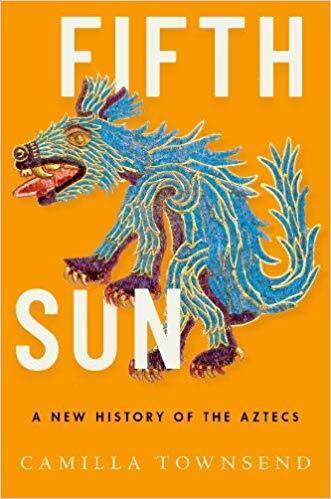 Fifth Sun by Camilla Townsend
Fifth Sun by Camilla TownsendFifth Sun: A New History of the Aztecs by Camilla Townsend: I think this is a terrific book, in the sense that it tells a valuable story in an accessible way and is filled with information that was completely new to me, even though I’ve been to central Mexico (the territory of the “Aztecs” several times). The thoroughness and authenticity of the book also prevent it from being an excellent read–there are so many names of people that are difficult for an English-speaking audience that the book, as others have noted, is a bit of a slog to get through. Nonetheless, I do recommend this book if you are interested in learning the history of the indigenous Mexicans and the Spanish conquest from the point of view of the people who were there before the Spaniards.
September 27, 2023
The Next Book–Part 4: Writing the Novel
[This is Part 4 in a series about my new book. Check out the previous installments here.]
Although I struggled for a long time—even after I’d written over 100 pages—with where in the story the reader’s experience should begin, eventually I settled on a spot that felt right to me. Without giving too much away, I wanted to show my main character in her natural environment, practicing law in New York City. This notion is derived from “Quest” literature in which the hero is first seen at home before setting off in search of some goal. This is the “world of common day” (to use Joseph Campbell’s term from The Hero with a Thousand Faces) or the “ordinary world” (to use Christopher Vogler’s application of Campbell’s analysis to mythic structures for writers in The Writer’s Journey). Glimpsing the hero in her ordinary world puts into context the adventure that she’s about to go on and gives the reader an idea of what’s at stake for her. That’s the theory, anyway.
So, the book begins in New York in the main character’s ordinary world, but before long she finds herself in Singapore. As I’ve described earlier in this series, when she gets there, she becomes aware of a woman who, many years earlier, came to Singapore and painted what she saw. My next challenge in the writing of the book was how to tell that woman’s story, too.
Early on, I opted to do this through diary entries. It seemed like a clear way to distinguish between the more contemporary narrative and the historical elements. For one thing, the diary entries are dated, so the reader should learn quickly that these chapters, which are generally shorter, are different from the other chapters. Also, the diary is in first person, naturally, whereas the contemporary part of the narrative is in third person. Finally, the language of the diary is different, more Victorian in prose style than the contemporary story.
The challenge for me was to figure out how to intersperse the diary entries with the narrative. In general, I tried to make the entries correspond in some way to what was happening in the main story, so that in addition to having its own narrative arc the diary would shed light on something that the main character is doing in the contemporary plot.
The logic of presenting the diary entries was also a puzzle for a long time. Why are the entries distributed throughout the book instead of appearing all together as a diary would be? And what does the main character do with the information in the diary? When I finally settled on answers to these questions, I finally felt comfortable with the weaving of the two stories together.
Probably you have read other novels that do this in some form. Before I got very far into the writing of the book, I asked on social media for examples of books that do this, and I was alerted to countless titles, many of which I then read. A frequent recommendation was A. S. Byatt’s Possession. Another was The Hours by Michael Cunningham. And then as I was finishing the book, Geraldine Brooks’s novel Horse came out. It was perhaps the best comparison of all because it involves a painting done more than a century before the contemporary narrative. Of course, by that time, my structure was settled, but the book, which has been widely read recently, is a useful way to explain my own novel’s form.
In case you were wondering where this series is going, eventually I’ll be telling you more about the plot, revealing the cover, and inviting you to pre-order the novel, which is often critical to the success of a book.
Next: The Agony of Traditional Publishing
September 11, 2023
I’ve Got Questions for Ginger Pinholster
Editor’s Note: This exchange is part of a series of brief interviews with emerging writers of recent or forthcoming books. If you enjoyed it, please visit other interviews in the I’ve Got Questions feature.
 Snakes of St. Augustine by Ginger PinholsterWhat’s the title of your book? Fiction? Nonfiction? Poetry? Who is the publisher and what’s the publication date?
Snakes of St. Augustine by Ginger PinholsterWhat’s the title of your book? Fiction? Nonfiction? Poetry? Who is the publisher and what’s the publication date?Title: Snakes of St. Augustine
Genre: Fiction
Publisher: Regal House Publishing
Publication Date: September 13, 2023
In a couple of sentences, what’s the book about?Snakes of St. Augustine, a love story served up with a large side of Florida weirdness, focuses on a woman’s quest to save her troubled brother, Gethin, and her magical, maddening entanglement with an equally complicated man named Jazz. Gethin’s disappearance coincides with the theft of Trina Leigh Dean’s beloved snakes. Trina’s friend Fletch, a burnt-out cop, searches for the stolen snakes, putting him on a dangerous collision course with Gethin and raising questions about the power of compassion.
What’s the book’s genre (for fiction and nonfiction) or primary style (for poetry)?Literary fiction.
What’s the nicest thing anyone has said about the book so far?Novelist Connie May Fowler (A Million Fragile Bones) said: “Snakes of St. Augustine is a relentlessly beautiful and compelling story. Ginger Pinholster sees into the hearts, minds, and souls of her vast and varied cast of characters with grace, insight, and humor. This novel will linger with readers long after the final page is read.”
What book or books is yours comparable to or a cross between? [Is your book like Moby Dick or maybe it’s more like Frankenstein meets Peter Pan?]In writing Snakes of St. Augustine, I was influenced by two books. in particular: We Are Called to Rise, by Laura McBride, and Pigs in Heaven, by Barbara Kingsolver. Both of those novels feature a diverse cast of characters and focus on the healing power of community. Snakes of St. Augustine explores how discrimination and stigma too often turn those with differences into “The Others,” and the importance of compassion and inclusion.
Why this book? Why now?When I saw a CNN news report of Dallas police shooting and killing Jason Harrison on June 14, 2014, the tragedy stuck in my head. Harrison’s mother had called the police because she needed help getting “Jay” to a hospital. Seconds after arriving on the scene, police shot the 39-year-old schizophrenic man five times, including twice in the back, according to CNN. Police bodycam video shows Harrison falling a few feet from his mother, who begins wailing, “Oh, they killed my son.”
Even now, this news report brings me to tears, especially because Harrison’s death was part of a broader trend: Of 994 people who were shot and killed by police officers in 2015, at least 25 percent suffered from acute mental illness at the time of their death, the Washington Post has reported. People with untreated mental illness are 16 times more likely to be shot and killed during an encounter with police, the Treatment Advocacy Center found.
The police bodycam footage of Jason Harrison’s death reminded me of loved ones, including my late brother John. He had a learning disability, attention deficit disorder, trouble communicating, severe anxiety and depression, and in the end, a substance abuse problem. He was 28 when he killed himself.
In writing my novel, I did not attempt to recreate any specific event. In no way do the family members and police officers in my book resemble the real-life players in Jason Harrison’s tragic death. All of my characters are composites, representing two trends: Individuals with mental health conditions who die during police encounters, and burnt out police officers who face dangerous situations without the proper training or tools.
Snakes of St. Augustine is fictional, but losing my brother to mental illness and subsequently finding a partner who has neurodiversity clearly influenced me. In my experience, discrimination can marginalize those with mental health conditions. To learn more, I read journal and news articles. I spoke with my partner Michele’s doctors as well as my sister, a mental health professional, about schizoaffective disorder. I learned that people living with psychosis are far more likely to be attacked, compared with the rest of us. Sadly, many police units lack the training or personnel to safely deal with individuals who have neurodiversity.
My novel is not about Jay, John, or Michele; all of my characters are composites, representing the trend of fatal encounters between police and individuals with mental health conditions.
Other than writing this book, what’s the best job you’ve ever had?I worked for 17 years as the chief communications officer for Science magazine and its publisher, the American Association for the Advancement of Science (“Triple-A-S”). It was an exciting, fast-paced job where I learned to write about science and technology and traveled all over the world. Aside from the AAAS, however, my favorite job was working as a reporter at the now-defunct Athens Daily News of Athens, Georgia. I only worked there for two years in my mid-20s, as a courts-and-cops reporter on the night shift, but I made some of the best friends of my life there. That was during the heyday of Athens as an artistic hub, where the B-52s and many other artists established roots.
What do you want readers to take away from the book?I hope my work will honor the lives of all those living with neurodiversity and an increased risk of harm. If some people feel more tolerance of those with “differences,” after reading my book, I would be very happy.
What food and/or music do you associate with the book?Tacos! My main characters, Jazz and Serena, first get to know each other while munching a meal from a fast-food joint.
What book(s) are you reading currently?Here in the Darkby Meagan Lucas and The Windward Road by Archie Carr.
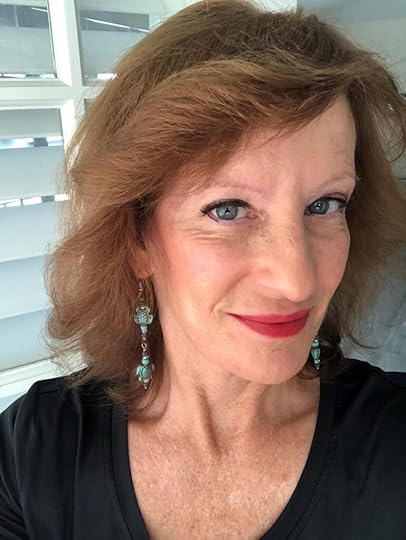 Ginger Pinholster
Ginger PinholsterLearn more about Ginger on her website.
Follow her on Twitter, Instagram, Facebook, and TikTok.
Buy the book from the publisher (Regal House Publishing), Bookshop.org, Amazon, or Barnes & Noble.



